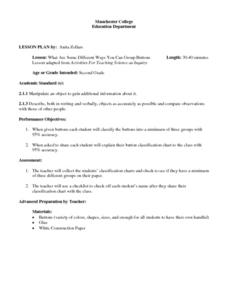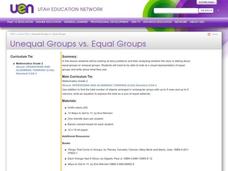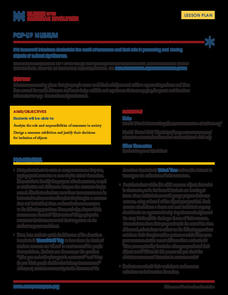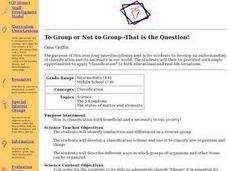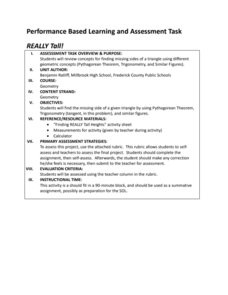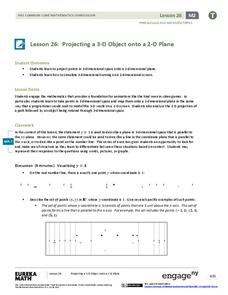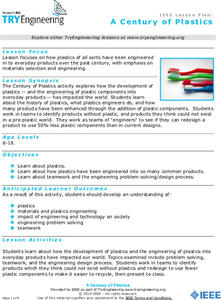Curated OER
What Are Some Different Ways You Can Group Buttons
Second graders classify and group buttons. They discuss how their buttons are alike and different, and identify the characteristics of their handful of buttons. Students then classify their buttons into three groups, and create a...
Curated OER
Compare Human-made Objects with Natural Objects
Students examine and observe how many human-made objects get their basic design from things in nature. They listen to the book "Nature Got There First," compare/contrast hollow bones with drinking straws, bird beaks and tool pliers, and...
Curated OER
Group Into Fives or Tens
In this group into fives or tens activity, students circle groups of fives or tens to count the total number. In this drawing activity, students find ten groups of five.
Curated OER
Unequal Groups vs. Equal Groups
Third graders read and discuss math story problems and analyze if the story is using equal groups or unequal groups. They listen to the book "12 Ways To Get to 11," and simulate the story using beads on a pipe cleaner. Students then...
Curated OER
Identify Numbers of Fall Objects
In this identifying numbers of fall objects worksheet, students read a number in each box and circle the correct number of fall pictures. Students circle four groups of fall objects.
US House of Representatives
Objects in Time
What is the role artifacts play in the study of past events and people? As part of an examination of the careers and contributions of women in Congress from 1917 to 2006, groups examine artifacts that symbolize each woman.
Curated OER
Arranging Numbers from 1 to 5
Kindergarteners arrange manipulatives or everyday objects in groups of one through five. They identify groups seen in pictures of nature and compare same numbers of different objects.
Teach Engineering
Scale Model Project
Try your hand at scale models. Scholars create a scale model of an object using a scale factor of their choice. As part of the project, they give presentations on their processes and calculations. This is the last installment of the...
Curated OER
Sorting Candy
Lower graders sort and group objects by their different properties. They watch a video about sorting then, sort and organize candy in different groups. Students compare how others sorted their candy. Finally, they decide which group has...
Museum of the American Revolution
Pop-Up Museum
Museums offer more than interesting exhibits—they are key to keeping history alive. An immersive activity uses a virtual field trip to show academics the importance of museums in preserving history. Young historians learn how museums are...
Curated OER
Color the Group That Has Less
In this comparing sets worksheet, students count the objects in each of 2 sets. Students circle the set that has the fewest objects. There are 3 questions; the pictures show bugs and butterflies.
Curated OER
To Group of Not to Group - That is the Question!
Upper elementary and middle schoolers use their observation skills to group different kinds of candy by similar characteristics. They debate whether or not we should classify objects. Finally, they learn that biologists have developed a...
Curated OER
Matter And Materials
Students investigate the concept of identifying different objects in nature and classifying them into different categories. The students will describe and explain a group of the objects orally and in writing form that is appropriate to...
Curated OER
Text as Object and Art: Aesthetic Impact on Audience Reception of Books in the Early Renaissance and Today
Tenth graders examine the role that aesthetics play in the publication of books. In groups, they apply the concept of physical affectation on each reader's experience to literature. They also compare and contrast the varied types of...
Curated OER
Count by 5s, 10s, and 100s
There's an easier way to count! Scholars get practice counting by 5 and 10 in this skip-counting worksheet. There are 10 problems, and for each they observe a set of objects that have been grouped. Learners skip count to get a final...
Radford University
REALLY Tall!
Conduct indirect measurements three ways. Working in groups, pupils come up with different ways to measure three tall objects indirectly. The teacher provides measurement information requested by the teams, and learners then calculate...
EngageNY
Projecting a 3-D Object onto a 2-D Plane
Teach how graphic designers can use mathematics to represent three-dimensional movement on a two-dimensional television surface. Pupils use matrices, vectors, and transformations to model rotational movement. Their exploration involves...
Concord Consortium
Target Game—Charge Magnitude/Force Relationship
Build an electric field to direct a charged particle to a target. Scholars determine how location and strength of charge affect the electric field that surrounds the object. They complete two challenges to strengthen their understanding.
Institute of Electrical and Electronics Engineers
A Century of Plastics
After reading about polymer materials, engineer trainees examine how plastics have been integrated into everyday products. In groups, they compile a list of products made entirely without plastics and then, as a closing activity, try to...
Pace University
Urban Communities
Urban communities are the focus of a series of lessons created to meet specific needs using differentiated instruction. A pre-assessment designates scholars into three groups based on their ability level. Small groups take part in...
Curated OER
Count by Grouping Into Tens
In this counting by grouping worksheet, students group shapes into tens by circling either groups of 5 or ten in ech. A reference website for additional resources is given.
Curated OER
Counting Groups to 10
In this counting instructional activity, students count each group and write the total in each box. In the instructional activity students are shown a variety of different objects to count.
Curated OER
Counting Groups to 10
In this counting 1-10 practice worksheet, learners improve their math skills as they solve 12 problems that require them to count the objects pictured in each group.
Curated OER
Classifying Objects into Group
Classifying and sorting are great skills all kids need to know. They cut out each of the six images provided, then label each of two boxes. They glue the images in the appropriate box. Answers are provided.


